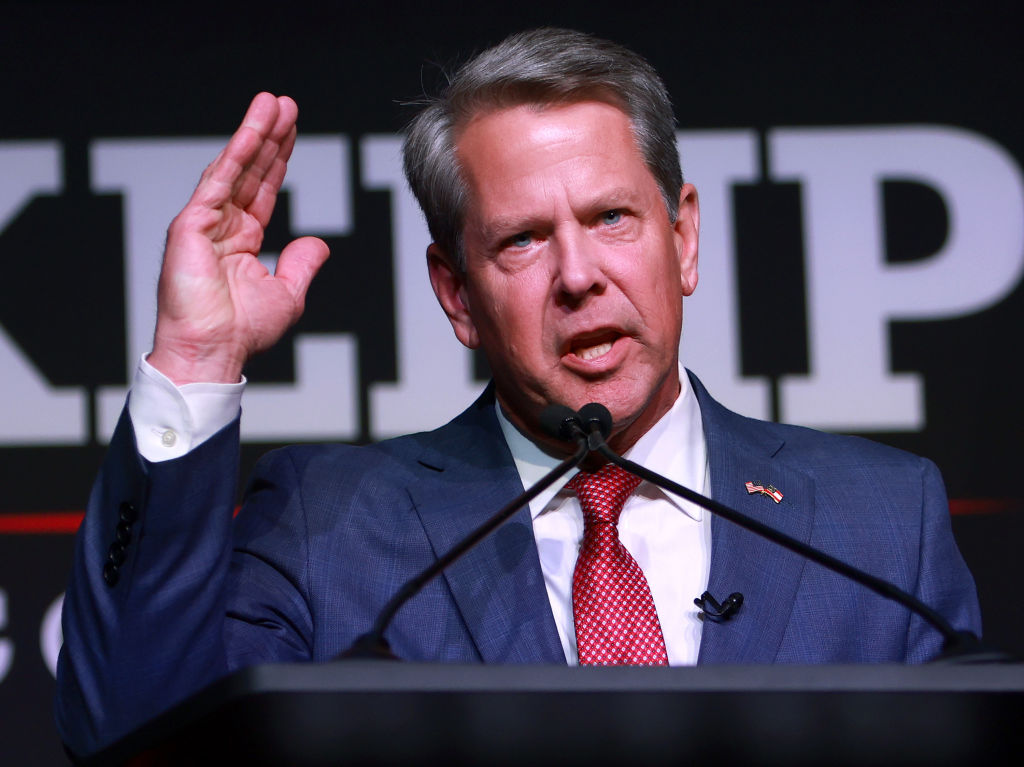President Trump won’t be eating peaches any time soon, but he’ll always have Georgia on his mind. For one of the first times this primary season, the former commander-in-chief has been handed what looks like a resounding rebuke in Georgia.
Governor Brian Kemp and secretary of state Brad Raffensperger bested their primary challengers, securing the Republican nomination handily. These men dared to stand athwart Trump’s alternate history about the 2020 election and were subjected to an endless barrage of attacks for not sacrificing their integrity. Ultimately, in their bout with the Goliath of the GOP, they emerged triumphant.
Now that the dust has settled, everyone seems to be clamoring to make sense of this double whammy in the context of recent Trump-endorsed candidates’ victories in Ohio and Pennsylvania. The question on everyone’s mind: is Trump’s influence on the Republican Party finally waning?
While liberals and anti-Trump conservatives would like to declare that kingdom has come, the notion that the MAGAmania has reached its zenith is unfounded. Trump continues to play an outsized role in Republican politics. His grip on the Republican base is tighter than ever and he controls the levers of power at the RNC.
Some inside the Beltway punditry might have you thinking otherwise because drive-by commentary has inflated the importance of endorsements. While endorsements provide mental shortcuts for voters seeking civic skin-in-the-game without investing the time and energy necessary to make an informed decision about a candidate and policies, they generally have little impact on voter preferences. Sometimes it seems like endorsements have become more of a credibility signaling mechanism tailored for other elite political actors than anything else. Demagoguery is no exemption from this rule.
In the case of Trump, it is crucial to consider the context. While he has hubristically pronounced that Republican candidates can’t win an election without his endorsement, Trumpian blusterous bombast should be taken with well more than a grain of salt. Georgia is the state he has become most fixated on in the wake of his 2020 election loss. He notoriously attempted to browbeat Raffensperger into throwing the election in his favor and subsequently tried to do the same to Kemp. After this disquieting banana republic-esque effort failed, Trump then depressed Republican turnout in the Georgia Senate runoffs with his rigged election conspiracism, and the GOP threw away two winnable Senate seats… again.
There’s plenty for both Democrats and Republicans to take issue with here. And in a state where primary elections are open to all voters regardless of their partisan affiliation, many Democratic voters are spurning strategery, rejecting the promotion of the most beatable Republican and instead attempting to cast ballots in GOP primaries to undermine Trump’s influence. Kemp also happens to be a very popular governor.
While much has been made of Trump’s post-presidency role as the Boss Tweed of Mar-a-Lago, he is more of a cultural avatar and mascot — a court jester rather a kingmaker. For the typical Republican voter, Trump represents someone combating wokeness and personifies their most visceral impulses; who he endorses is largely irrelevant to them.
You might argue that Trump’s primary endorsements are most decisive in hotly contested races where the margins of victory are slim, as evidenced by the recent races in Ohio and Pennsylvania. That is entirely plausible. But those who long for Trump’s egress from American politics ought not to get their hopes up. Just because his endorsements don’t pan out doesn’t mean he’s going anywhere. For better or for worse, The Donald is here to stay.

























